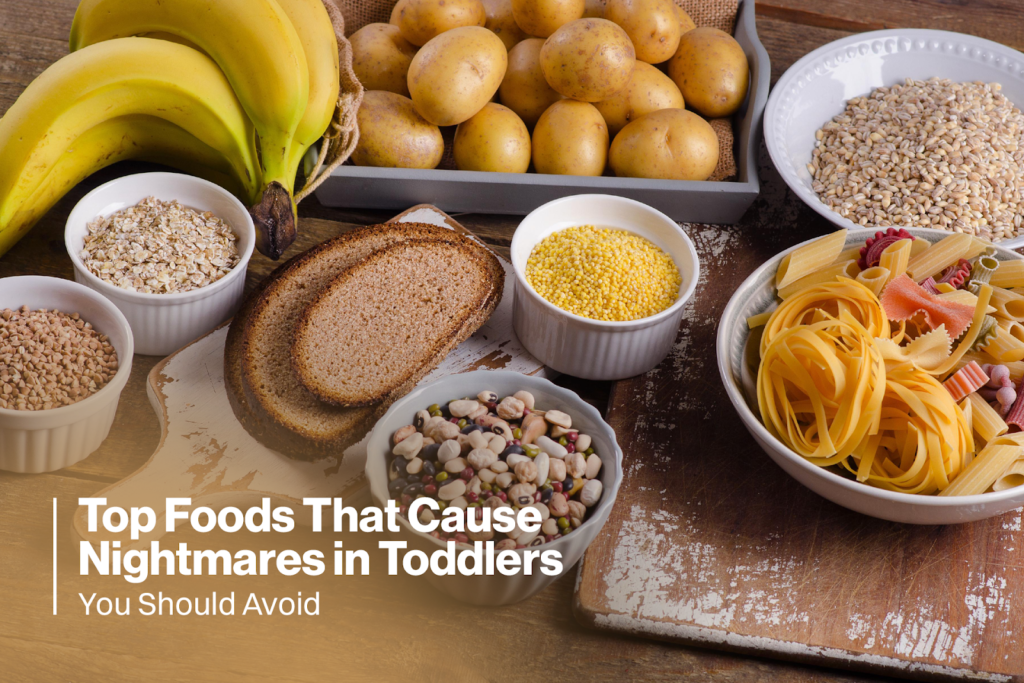Watching your kid wake up with a nightmare makes you upset, right? Besides, as parents, we all know how distressing a nightmare can be for toddlers. Now, could certain foods be to blame?
Well, though it’s not conclusive, reportedly there are foods that cause nightmares in toddlers. Such as cheese, milk, spicy foods, and carbohydrate-rich foods can trigger nightmares. Plus, if your child eats right before bedtime, it can also increase the chance.
However, some parents get confused between nightmares and night terror. So, we’ll clear up the confusion. Plus, we’ll share how you can help your toddler overcome the nightmare issues.
Key Takeaways
- Foods that Cause Nightmares: Spicy foods, milk, cheese, and high-carb meals like pasta or bread can cause nightmares. Even eating close to bedtime may increase the chances of nightmares.
- Other Causes of Toddler Nightmares: Nightmares in toddlers often stem from anxiety, fear, or stress. For example, changes in routine or exposure to new experiences like daycare.
- Nightmares vs Night Terrors: Nightmares happen later in the night and involve anxiety, while night terrors occur earlier and stem from poor sleep transitions. Nightmares are often remembered, but night terrors are not.
- Preventing Nightmares: A consistent bedtime routine, avoiding scary media, and reducing late-night eating can help prevent nightmares. Talking with toddlers about their fears is also important.
What are Toddler Nightmares?
Toddler nightmares are vivid, unsettling dreams that wake your child from sleep. These dreams can be quite real to them, and if they can talk, they might want to share what happened.
Many kids, especially between the ages of 3 and 6, have nightmares often. Even older kids, around 6 to 12, might have them too, but not as much. Most kids stop having bad dreams as they grow up.
However, some might have a problem called nightmare disorder. This is when they keep having scary or unpleasant dreams that make it hard for them to sleep.
Different Foods That Cause Nightmares In Toddlers
Before we talk about food, there’s something you should know.
Experts at the Pediatric Sleep Council don’t think babies experience nightmares. It’s normal for babies and toddlers to cry when they wake up at night, but that doesn’t mean they’re having a bad dream.
That said, allegedly here are some foods that cause nightmares in kids —
- Dairy Products: Milk, ice cream, and cheese are known to be linked with strange and disturbing dreams. These foods can be hard to digest late at night. So, it can lead to restless sleep and possible nightmares.
- Spicy Foods: Spicy dishes come next on the list. These can upset your toddler’s stomach and make their sleep more restless. Hence, bad dreams might take place.
- High-Carb Foods: Foods high in carbohydrates, such as pasta or bread, may also contribute to unpleasant dreams. While carbohydrates are necessary for energy, it’s best to avoid them before bed.
- Late-Night Eating: Eating too close to bedtime, regardless of the food type, has been reported to trigger nightmares. So, you should keep dinner times earlier to avoid these sleep disturbances.
What Gives Toddlers Nightmares?
Toddlers often have nightmares because they’re scared or anxious. These feelings aren’t usually caused by food or lack of sleep. You can help them relax with some mindfulness exercises for anxiety before bed to reduce these bad dreams.
As they grow, they spend more time in a sleep stage where they dream a lot, which can cause bad dreams.
Plus, things like starting daycare or having a new baby can make toddlers feel stressed and have nightmares. Also, fevers and some medicines can cause nightmares.
Look, it’s normal for toddlers to be afraid of things like monsters or things they saw on TV. But if they’re really scared, it might mean they have anxiety or have been through something bad.
So, parents should talk to their childs about these fears.
How are Nightmares Different from Night Terrors?
Nightmares and night terrors are two different things that can happen to children while they sleep. Both can be scary, but they happen at different times and have different causes.
So, here’s a table to show you the differences so you can help your toddler —
| Factors | Nightmares | Night Terrors |
| When They Occur | Typically more than 3 hours after falling asleep. | Usually 1 to 2 hours after falling asleep, early in the night. |
| Triggers | Often related to common fears like storms or monsters. | Linked to poor sleep habits or overtiredness. |
| Child’s Reaction | May whimper or cry softly, and can be easily consoled. | May shout, scream, or thrash, and cannot be comforted. |
| Waking Up | Can wake up and recall the dream. | Doesn’t wake up and won’t remember the event. |
| Cause | Anxiety and fear. | Poor transition between sleep stages |
Remedies for Night Terrors In Toddlers
If your toddler is having scary dreams at night, there are things you can do to help. Simple changes to their routine can make a big difference.
- If your child’s age is 1 to 2 years, make sure your child is getting the recommended 11 to 14 hours of sleep.
- Try to put them to bed at the same time every night.
- Don’t allow drinking or eating (except water) right before bedtime.
- Give them sugar alternatives like figs or dates as they’re rich in nutrition.
- Avoid screens, including tablets and phones, 2 to 4 hours before sleep.
- Keep the bedroom cool and cozy to help your child feel relaxed.
- Illness can sometimes cause nightmares or night terrors, so monitor their health.
- Stay away from frightening shows or movies, especially if your child tends to have nightmares after watching them.
- Talk to your child about any worries or fears they have. Drawing or writing down their feelings can help, and if needed, counseling may be necessary.
- If your child shows signs of sleep disorders or anxiety, talk to a healthcare professional for advice.
3 Sleep Tips to Prevent Nightmares in Toddlers
Even adults get scared through nightmares, so they can be really scary for little ones. So, here are some ways to help your child sleep better and feel safer at night.
Keep a Regular Sleep Schedule
If your child is tired, they might have nightmares. So, to help them sleep better, follow a regular bedtime routine and take naps at the right times. Also, try to have at least 5 to 6 hours between their nap and bedtime.
Talk About Their Fears
When kids get older, they might start to be afraid of things like the dark, monsters, or even shadows! It’s okay to talk to them about what scares them, even if they don’t know how to say it.
Just listening to them can make them feel better. Putting a soft nightlight in their room can also help them feel safe.
Be Careful About What They Watch
Some shows or movies might not be good for young kids, even if they say they are. If there are scary things like storms, dark skies, witches, or mean characters, it could make kids afraid.
So, you should be aware of what your child is watching so they don’t get scared before bed.
Final Words
We’ve talked about the foods that cause nightmares in toddlers. Dairy products, spicy foods, sugary foods, and eating too close to bedtime might be the problem.
So, pay attention to what your kids eat before bed and see how it affects their sleep. If you change their diet and bedtime routine, you can help them have fewer nightmares.
Remember, these small changes can really help your child sleep better at night.
FAQs
Can sugar cause night terrors in toddlers?
Yes, eating too much sugar can cause night terrors instead of good ones. That’s because sugary foods like candy, or cake make you feel more awake. It makes it harder to fall asleep.”
Are nightmares a bad thing?
Nightmares are bad, and we want to stop them from happening (especially to our kids). But it’s okay to have nightmares sometimes. For adults, nightmares can help us deal with things we’re afraid of. However, we don’t know if nightmares help kids deal with stress.
Should I wake my toddler from a nightmare?
No, don’t wake up your toddler. Instead, try to help your child sleep normally again. Plus, say nice things to them and hold your child if it helps them feel better.







